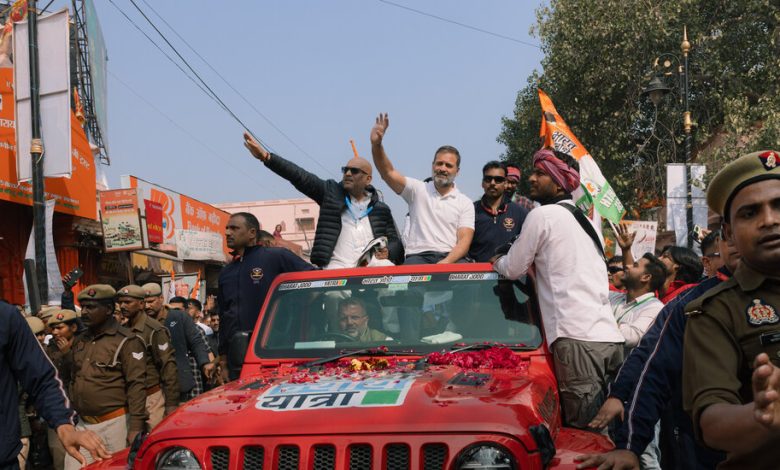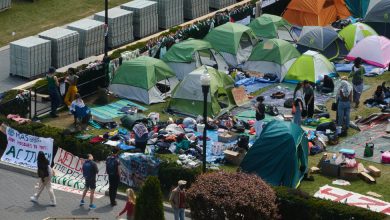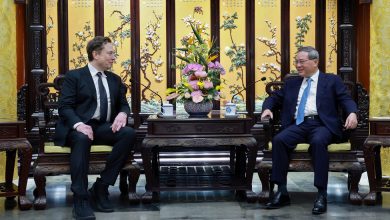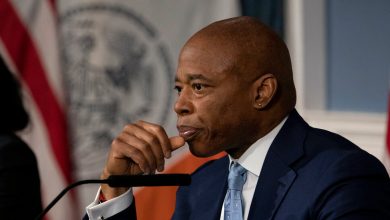Time Is Running Out for Rahul Gandhi’s Vision for India

Rahul Gandhi stood in a red Jeep, amid a churning crowd in Varanasi, trying to unseat the Indian government with a microphone in his hand. “The mic isn’t good,” he said. “Please quiet down and listen.” It was the morning of Feb. 17 — Day 35 of a journey that began in the hills of Manipur, in India’s northeast, and would end by the ocean in Mumbai, in mid-March. In total, Gandhi would cover 15 states and 4,100 miles, traveling across a country that once voted for his party, the Indian National Congress, almost by reflex. No longer, though. For a decade, the Congress Party has been so deep in the political wilderness, occupying fewer than a tenth of the seats in Parliament, that even its well-wishers wonder if Gandhi is merely the custodian of its end.
Listen to this article, read by Vikas Adam
Gandhi called his expedition the Bharat Jodo Nyay Yatra — roughly, the Unite India March for Justice. He never said it in so many words, but the yatra was an appeal to voters to deny Prime Minister Narendra Modi and his Bharatiya Janata Party a third straight term in parliamentary elections starting on April 19. Congress, the only other party with a national presence, is the fulcrum of an anti-B.J.P. coalition. Indian pundits and journalists bicker about many things, but on this point they’re unanimous: Only a miracle will halt the B.J.P. Still, it falls to Gandhi, steward of his enfeebled party, to try.
The speech lasted barely 15 minutes. Gandhi is a fidgety orator, unable to shrug off the routine disturbances of a rally. He kept calling for silence, and scolding overzealous policemen regulating the mob. He didn’t ramble, exactly, but eddied around the point he wanted to make. “This is a country of love, not of hate,” he said. He talked of two Indias, populated respectively by the millionaires and the impoverished. He laid into TV news channels, many of which have been captured by oligarchs prospering under the B.J.P.: “They won’t show the farmers, or the workers or the poor,” he said. “But they will show Narendra Modi 24 hours a day.” Then he helped onto his Jeep a member of the audience, a young man who complained that, despite spending hundreds of thousands of rupees on his education, he still had no job. His is a common story in Modi’s India. Two out of every five recent college graduates are out of work, and young people make up 83 percent of the unemployed. To his crowd, Gandhi called out: “These are the two issues facing India: unemployment and — ?” He received only a tepid response of “poverty.” When he finished, there was no applause.
The crush of people at the rally was suffocating, although in India a crowd is no index of popularity. People may gawk and then go vote for the other guy — and Gandhi is, after all, one of the country’s most recognizable men. Officially, he is no longer his party’s president, but he is undoubtedly its face. At 53, with a well-salted beard and serious eyes, he’s too old to be called Congress’s “scion,” but he still wears the sheen of dynasty. His great-grandfather, the unflinchingly secular Jawaharlal Nehru, was India’s first prime minister. His grandmother, Indira, and his father, Rajiv, both became prime ministers; both were assassinated. His mother, Sonia, steered Congress into government in 2004 and 2009, but declined the top post. Then, on the heels of several corruption scandals, the mighty party — 140 years old next year — came unstuck. Out of 543 seats in the lower house of Parliament, Congress holds just 46, compared to the B.J.P.’s 288. Gandhi embodies all this history: the triumphs as well as the failures. For the crowds, that is the fascination he exerts.
One of Modi’s successes has been not just to trounce the Congress Party but also to persuade people that the party has weakened India and emasculated its Hindus. Through his cult of personality, Modi is fulfilling a century-old project, recasting India as a Hindu nation, in which minorities, particularly Muslims, live at the sufferance of the majority. Emblematic of this is a new law offering fast-tracked citizenship to people fleeing Pakistan, Bangladesh or Afghanistan — as long as they aren’t Muslim. It is the B.J.P.’s totemic achievement: the use of religion to decide who can be called “Indian.” Opposing this law or indeed resisting the B.J.P. in any way has proved difficult. Investigating agencies mount flimsy cases against critics of the government, as Amnesty International has frequently noted. (Amnesty itself halted its work in India in 2020, in the midst of what it later called an “incessant witch hunt” by the government.) Activists are regularly imprisoned, sometimes on the basis of planted evidence; journalists are sent to jail or otherwise bullied so frequently that India has slipped to 161st out of 180 countries in the World Press Freedom Index, just three spots above Russia. Pliant courts often endorse it all. Such is the mood in India that one of the plainest sentences in Congress’s election manifesto is also one of its most resonant: “We promise you freedom from fear.”




